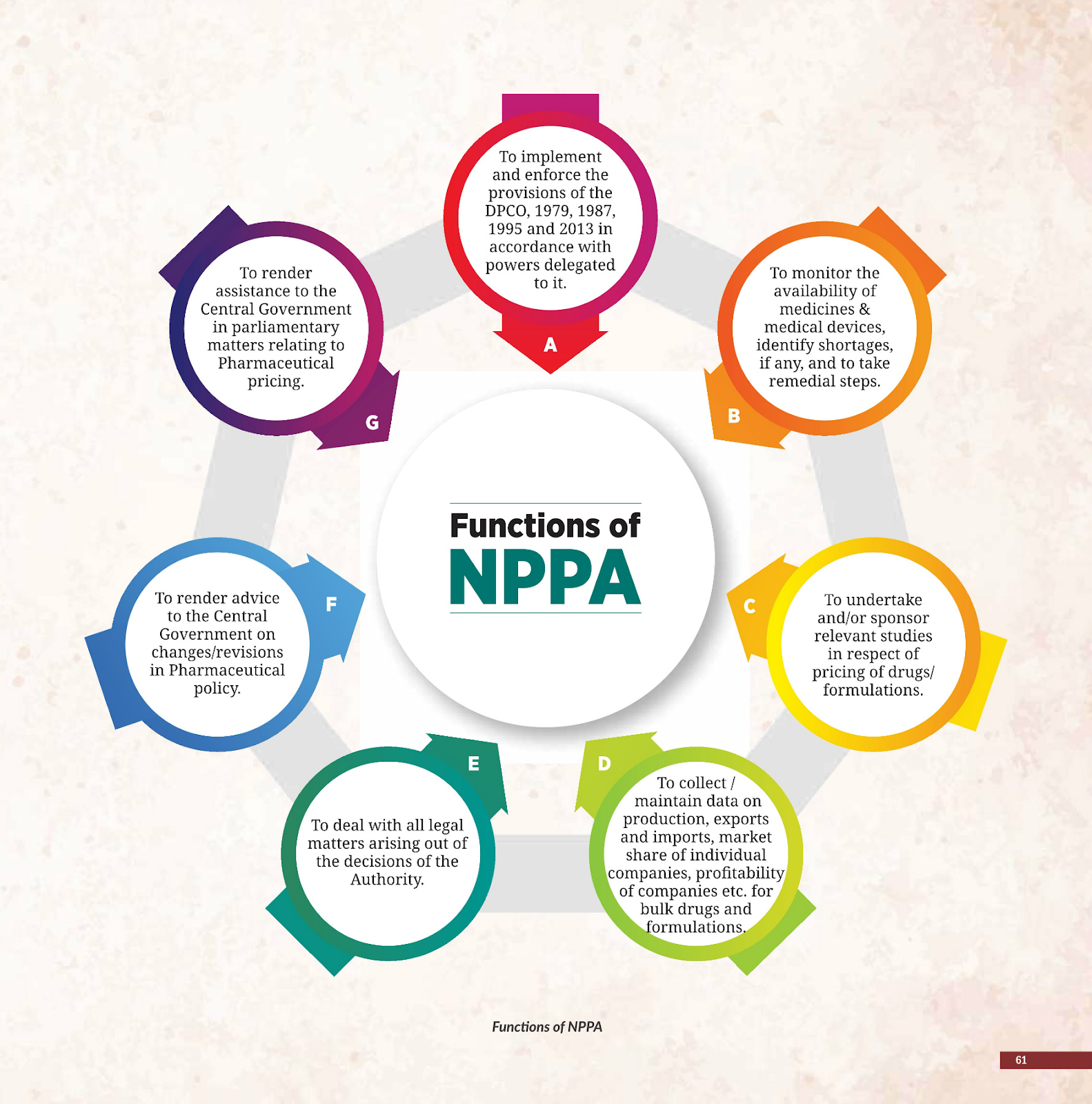Facts for UPSC Mains
National Pharmaceutical Pricing Authority
- 26 Aug 2025
- 6 min read
The Parliamentary Standing Committee has criticized the National Pharmaceutical Pricing Authority (NPPA) for allowing a 50% price increase on 11 essential drug formulations in 2024.
- In 2024, NPPA approved price hikes for drugs including those used for treating bacterial infections, asthma, and bipolar disorder in line with the Drugs Prices Control Order, 2013 guided by CAMPH (Committee on Affordable Medicines and Health Products), NITI Aayog.
What are the Key Observations & Recommendations of the Standing Committee on Drug Pricing?
- Key Observations:
- Concern Over Public Health Impact: The Standing Committee on Chemicals and Fertilizers expressed serious concerns about the potential negative effects of the price hikes on public health, particularly in the context of affordability and access to essential medicines.
- Limited Justification: The committee noted that the NPPA's justification of price hikes was based on the increased cost of production, active pharmaceutical ingredients (APIs), and exchange rates, but the impact on the affordability of medicines was not adequately considered.
- Regulatory Gaps in Cancer Drug Pricing: The Committee on Petitions (Rajya Sabha) observed that while the number of anti-cancer drugs under price control in NLEM 2022 increased from 40 to 63, a large number of oncology medicines remain outside the Drugs (Prices Control) Order, 2013.
- This lack of statutory price regulation has led to high and often unaffordable cancer drug prices, severely restricting patient access.
- Key Recommendations:
- Reconsider Price Hike Mechanism: The committee recommended that the NPPA re-evaluate its decision-making process for price hikes, ensuring that price increases are reasonable and affordable for the public.
- Expand Price Control on Critical Drugs: The committee urged the government to broaden price control regulations, particularly on oncology drugs, to make them affordable and accessible for the entire population.
- Ensure Transparency in Price Adjustments: The committee emphasized that any future price hikes should be transparent and backed by clear criteria that prioritize public welfare and patient accessibility.
- Stronger Oversight on Non-Essential Drugs: The panel recommended that NPPA should strengthen oversight on non-essential drugs and ensure that manufacturers are not able to increase Maximum Retail Prices (MRPs) by more than 10% annually without justification.
- Regular Monitoring and Inclusion: The committee suggested the regular monitoring of drug prices and urged the inclusion of a wider range of medicines under price control to ensure affordable access for the general public.
What is the National Pharmaceutical Pricing Authority (NPPA)?
- About: NPPA is the independent regulator for drug pricing in India, ensuring availability and affordability of medicines.
- It was constituted in 1997 under the Department of Pharmaceuticals, Ministry of Chemicals & Fertilizers.
- It balances consumer affordability with industry growth, supporting India’s role as the “Pharmacy of the World”.
- The pharmaceutical industry in India is valued at USD 50 billion (2023-24) & is projected to reach USD 130 billion by 2030.
- Outreach & Transparency: NPPA is expanding through Price Monitoring and Research Units (PMRUs) in 31 States/UTs and administers public platforms like Pharma Sahi Dam (medicine price information) and Pharma Jan Samadhan (grievance redressal).
- Integrated Pharmaceutical Database Management System 2.0 (IPDMS) digital system strengthens monitoring, transparency, and accountability in the pharmaceutical sector.
Pharma Sector Regulations in India
- Central Drugs Standard Control Organization
- Drugs and Cosmetics Act, 1940
- Drugs and Magic Remedies (Objectionable Advertisements) Act, 1954
- National Medical Devices Policy, 2023 and the Pharmaceutical Technology Upgradation Assistance Scheme
|
Read More: Revamping India’s Pharmaceutical Landscape. |
|
Drishti Mains Question: Essential drug pricing in India must strike a balance between affordability for patients and sustainability for the pharmaceutical industry. Discuss. |
UPSC Civil Services Examination, Previous Year Question (PYQ)
Prelims
Q. Which of the following are the reasons for the occurrence of multi-drug resistance in microbial pathogens in India? (2019)
- Genetic predisposition of some people
- Taking incorrect doses of antibiotics to cure diseases
- Using antibiotics in livestock farming
- Multiple chronic diseases in some people
Select the correct answer using the code given below.
(a) 1 and 2
(b) 2 and 3 only
(c) 1, 3 and 4
(d) 2, 3 and 4
Ans: (b)
Mains:
Q. How is the Government of India protecting traditional knowledge of medicine from patenting by pharmaceutical companies? (2019)







